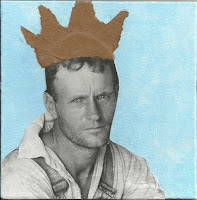A few events this week, including the wonderful Oakland Book Festival on Sunday, May 22, at Oakland City Hall.
I'll post a link to the Festival program later today.
Tomorrow (Thursday, May 19) I'll be reading at 6:30PM at Alley Cat Books in the Mission in San Francisco to celebrate the publication of a new issue of FOURTEEN HILLS magazine. Go to the link to see more about the magazine and the other readers. Editor in Chief Esther Patterson and her staff were kind enough to take three pieces from my next book, Wite-Out, for publication in this issue; re-posting one of them here.
DOLL VALUES
Always following disaster. Even when I was a kid. Long stories, believe me. Several steps behind damage. When a mother says keep your eyes on them and she goes on dumping potatoes in the water she probably doesn’t know you will go on watching them for the rest of your life. As if anything could make you stop.
- EILEEN MYLES
1
Sitting in Café Mogador, waiting for Isabel and Eileen, I take
out my newspaper.
2
There were too many people on the pleasure boat that night on
the Long Island Sound.
The little girl had decorated her room with butterflies and
elephants so there were butterflies and elephants on her coffin.
3
Here’s what they do with the rotting carcasses of horses: a
truck picks them up, maggots and all. “They go into ladies’ cosmetics,” says
the man who shovels the mess into a truck. “Lotions and creams.” Grease and
horror redeemed, churned into beauty butter.
4
This week in death: Don Cornelius, Mike Kelley, Dorothea
Tanning, Wisława Szymborska. And that little girl and the boy on the boat.
The kids were watching Fourth of July fireworks on a boat named
the Candy 1. There is no Candy 2.
I suddenly realize that I don’t really believe that women die,
so they can’t escape suffering.
5
Isabel arrives wearing a plaid polyester skirt, not what she was
wearing when she left the house in Brooklyn this morning. She looks sheepish
and beautiful and sweaty, and she smells like the thrift store. The skirt is
too big for her so she’s rolled it at the waist.
She keeps coming home from the Goodwill with clothes that might
have been my clothes in the 1980s. One day she brought home a crop top that
looked just like what I wore at my brother’s deathbed.
6
Eileen comes and locks her bike with a heavy chain. It takes a
long time, the chain rattling like something in a dungeon. On her way to our
table she says hi to someone.
“Do you know Fred Tuten?” she asks. “That’s Fred Tuten.”
A name that sounds like a toy company.
She’s so handsome. Her teeth. And she sounds like everyone I
grew up with. The way I still sound when I read aloud to children.
The first time I met Eileen, seventeen years ago, in a gallery,
I was newly pregnant with Isabel. I was kneeling to get something out of my bag
and I looked up and Susan introduced us. “Have you met Eileen? Linda’s from
Boston too.”
I remember the blue rayon dress I was wearing that night. It
cost $45.00 at Street Life on Broadway. A lot of money for me. It was shorter
than the dresses I usually wore. It made me feel so pretty. I wore it in Italy
with my husband early in my pregnancy.
Annunciations, nativities, last suppers and crucifixions,
depositions, resurrections, assumptions and ascensions. A few Magdalenes. And,
on St. Joseph’s Day, the Pietà.
I looked at a hundred Madonnas in that dress. I became a Madonna
in that dress.
By the eighth week, it was too tight for me. Later, in
California, after I lost so much weight, I took it out of storage. It had a low
neckline that I could pull down when I needed to nurse.
7
Joey was a snob. You couldn’t eat candy or fried food in front
of him without being criticized. In the deep polyester era he wore only cotton,
wool, or cashmere; no blends. Not even when he worked as a barback at Studio
54.
One night we arranged to meet down here to go to the Public. I
arrived eating Starbursts two at a time. “How can you eat those?” he said.
“It’s like eating a candle or something!”
In all the old pictures he has positioned himself next to me and
I’m ignoring him. He used to look up to me. Now he was ashamed of me.
I gave the rest of my candy to a homeless man lounging in front
of Cooper Union, making a little show of my tenderness. Joey just kept walking.
I had to run to catch up with him.
It was always like that with him now—like I might never see him
again. And then one day I never saw him again.
8
It’s the longest day of the year or feels like it. Why do we get
this much time? The light angles into the cavern of the street, it’s in their
eyes and they can’t see me. I watch them while they eat. My writer. My
daughter. “My tiny, tiny my-ness.”












